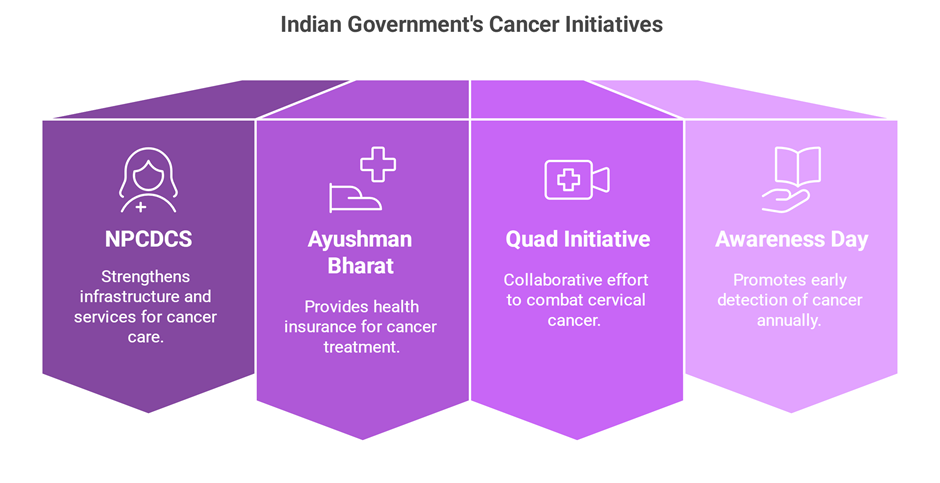Context: February 4, 2025, marks World Cancer Day, a global initiative dedicated to raising awareness about cancer and its impact on individuals, families, and communities. The theme for 2025-2027, "United by Unique," underscores the importance of a people-centered approach to cancer care, recognizing the diverse needs of patients worldwide.
About Cancer:
Cancer is a group of diseases characterized by the uncontrolled growth and spread of abnormal cells, which can invade and destroy healthy tissues and organs. It remains one of the leading causes of death globally, with 20 million new cases and 9.7 million cancer-related deaths reported in 2022. The burden is particularly severe in low- and middle-income countries, where access to prevention, diagnosis, treatment, and care remains limited.
Causes of Cancer:
Cancer arises from genetic mutations or abnormalities that disrupt the normal cell cycle. In a healthy body, cells grow, divide, and die in a regulated manner. However, cancer cells lose the property of contact inhibition, leading to uncontrolled division and tumor formation.
· Symptoms of Cancer: Common symptoms include persistent pain in a specific area, unexplained swelling, redness, or darkening of the skin or tissue. Early detection plays a crucial role in improving treatment outcomes.
· Treatment Options: Cancer treatment continues to evolve with advancements in medical research. One promising approach is RNA interference (RNAi) technology, which focuses on gene silencing therapies to target cancer cells more effectively.

Indian Government's Initiatives for Cancer Treatment and Prevention:
1. National Programme for Prevention and Control of Cancer, Diabetes, Cardiovascular Diseases, and Stroke (NPCDCS): Strengthens infrastructure, human resources, health promotion, early diagnosis, management, and referral services for major non-communicable diseases, including cancer.
2. Ayushman Bharat Scheme: Provides health insurance coverage to economically vulnerable families, ensuring access to cancer treatment.
3. Quad Cancer Moonshot Initiative: A collaborative effort by India, the US, Australia, and Japan to reduce the burden of cervical cancer in the Indo-Pacific region.
4. Awareness and Early Detection:
o National Cancer Awareness Day (November 7th) is observed annually to highlight the importance of early detection in improving survival rates.
WHO Initiatives:
The World Health Organization (WHO) has launched several global programs to address the increasing burden of cancer:
- Global Initiative for Cancer Registry Development: Enhances data collection and analysis for better cancer control strategies.
- Global Initiative for Childhood Cancer: Aims to improve survival rates for children with cancer worldwide.
- Global Strategy to Accelerate the Elimination of Cervical Cancer: Focuses on vaccination, screening, and treatment to reduce cervical cancer cases globally.
Conclusion:
World Cancer Day serves as a crucial platform to spread awareness, promote early detection, and encourage collaborative efforts in cancer prevention and treatment. With initiatives at national and global levels, a people-centered approach is essential to achieving better cancer care and reducing its impact on communities worldwide.







